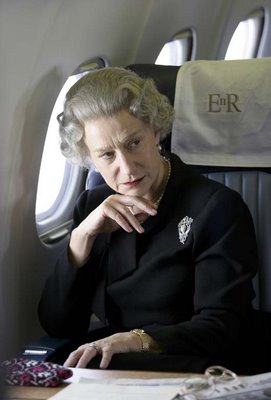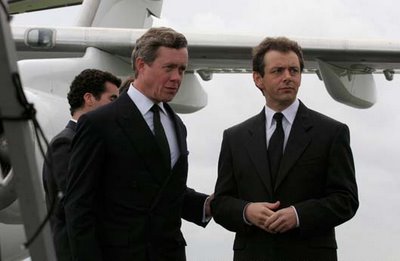Holiday at the Movies: The Queen
 Helen Mirren in The Queen, directed by Stephen Frears, 2006 |
| Other Reviews: Anthony Lane | Le Figaro | Manohla Dargis | Desson Thomson | Ty Burr | Others |
Stephen Frears has directed several of my favorite movies, including Prick Up Your Ears (1987), Dangerous Liaisons (1988), and High Fidelity (2000). Those films are more different from one another than similar, but what Frears does wondrously in each of them is to make the viewer sympathize with a not so sympathetic character. He has done it again in The Queen, leading me to understand a little better some of the worshipful veneration of the late Princess Diana and even to feel pity for a monarchical relic of ages past, Elizabeth Windsor. This is largely due to the mind-bending work of Helen Mirren, who has had memorable outings in royal roles before, including Elizabeth I, Queen Charlotte in The Madness of King George, and in a way even as Morgana in Excalibur.
 Alex Jennings and Michael Sheen in The Queen, directed by Stephen Frears, 2006 |
When the Queen drives her own Royal Range Rover out to find the hunting party on the windswept slopes, Mirren is at her strongest in an encounter with the quarry, a magnificent stag. At a private picnic, Prince Philip and the Queen Mother (a boozy Sylvia Syms) urge Elizabeth not to give into public demands to fly a flag at half-staff over Windsor Castle. The only flag that flies there is the royal standard, and only when the monarch is in residence. Do these protocols really matter anymore? Here the Queen Mother and her daughter are convinced that they do, and the new Prime Minister, Tony Blair (Michael Sheen, in a truly uncanny bit of mimicry), does his best to prevent the royals from making themselves completely irrelevant. Happily, The Queen is not really about the specific events around the death of Princess Diana. It is about how the British monarchy does or does not connect to the people it aims to serve. Apparently, the people still want them to.





















































2 comments:
I already had a soft spot for the monarchy, so I guess I was predisposed to support the queen's view of this going in, but I was still thoroughly won over by Dame Mirren's great performance .. One other Frears flick I just love is The Snapper, based on the great novel by Roddy Doyle
The Queen's personal reaction to Diana's death surely covered a range of ambivalent feelings, and was not limited to her cold insistence on protocol, as suggested by the film.
Charles tells his mother, "The Diana we knew was very different than the Diana idolized by the public", but this truth is never developed in the film. I'll mention it here.
While the "people's princess" remains the icon of superficial popular culture, the Royals knew a very different, darker character behind the facades of glamour and pseudo-compassion.
Both Diana and her brother, Charles Spencer, suffered from Borderline Personality Disorder caused by their mother's abandoning them as young children. A google search reveals that Diana is considered a case study in BPD by mental health professionals.
For Charles Spencer, BPD meant insatiable sexual promiscuity (his wife was divorcing him at the time of Diana's death). For Diana, BPD meant intense insecurity and insatiable need for attention and affection which even the best husband could never fulfill.
Clinically, it's clear that the Royal family did not cause her "problems". Rather, Diana brought her multiple issues into the marriage, and the Royal family was hapless to deal with them.
Her illness, untreated, sowed the seeds of her fast and unstable lifestyle, and sadly, her tragic fate.
Post a Comment